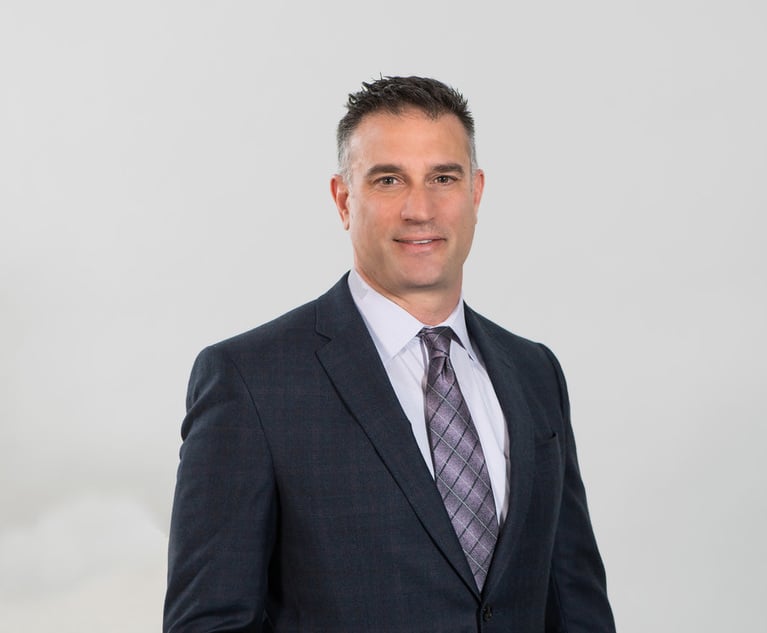Defense: Motorist Ignored Stop Sign, Caused Collision
On May 18, 2018, plaintiff Richard Wimmer, 63, was driving at the intersection of Charles Street and Passmore Street in Philadelphia. The driver's side of his sedan was struck by the front of a car. Wimmer claimed neck and back i
January 30, 2020 at 04:03 PM
4 minute read
Wimmer v. Rodriguez
Defense Verdict
Date of Verdict: Dec. 2, 2019.
Court and Case No.: C.P. Philadelphia No. 180702973.
Judge: Karen Shreeves-Johns.
Type of Action: Motor vehicle.
Injuries: Neck and back injuries.
Plaintiffs Counsel: Kevin M. Blake, Smith Mirabella Blake.
Plaintiffs Experts: Michael A. Crandall, chiropractic, Levittown; Stephen F. Ficchi, pain management, Philadelphia.
Defense Counsel: Jeffrey E. Tenthoff, Goldberg, Miller & Rubin, Philadelphia.
Defense Experts: Harvey E. Smith, orthopedic surgery, Philadelphia.
Comment:
On May 18, 2018, plaintiff Richard Wimmer, 63, was driving at the intersection of Charles Street and Passmore Street in Philadelphia. The driver's side of his sedan was struck by the front of a car. Wimmer claimed neck and back injuries.
Wimmer sued the driver, Carmen Rodriguez. Wimmer alleged that she was negligent in the operation of a vehicle.
The lawsuit alleged that Wimmer was driving on Charles Street, with Rodriguez driving on Passmore Street. Wimmer asserted that Rodriguez drove through a stop sign and struck his vehicle.
Wimmer's counsel relied on the testimony of a witness who was allegedly driving behind Wimmer at the time. The witness stated that Wimmer was driving on Charles Street when Rodriguez disregarded the stop sign on Passmore Street, causing the accident.
The defense maintained that Wimmer was comparatively negligent. Rodriguez alleged that she was driving on Charles Street and Wimmer on Passmore Street. She contended that it was Wimmer who drove through the stop sign, causing the accident.
The defense argued that it would have made sense for Wimmer to be traveling on Passmore Street, since that would have been the direction in which he was going to arrive at his home, located less than a block from the intersection. The defense further questioned the credibility of Wimmer's witness, as he did not identify himself as a witness at the scene, and there was no corroborating evidence that demonstrated he was where he claimed to have been.
Wimmer was taken by ambulance to an emergency room and given pain medication. Wimmer was ultimately diagnosed with a cervical strain and sprain, bulging at lumbar intervertebral discs L3-4, L4-5 and L5-S1, and lumbar radiculopathy.
A few days following the accident, Wimmer, complaining of lower back pain, presented to his primary care physician. On May 29, 2018, Wimmer presented to a pain management facility and received treatment through Dec. 20, 2018. His treatment included physical therapy, pain medication and percutaneous electrical nerve stipulation.
From June 12, 2018, to Nov. 16, 2018, Wimmer underwent chiropractic care. His treatment consisted of massage and spinal manipulation. During that time, Wimmer underwent an MRI and an electromyography of his lumbar spine. He received no further treatment after December 2018.
Wimmer's pain management doctor and chiropractor causally related Wimmer's injuries and treatment to the accident. According to the physicians, Wimmer suffered a serious impairment of a bodily function, his prognosis is poor and he requires future treatment, including epidural injections and physical therapy.
Wimmer testified that he experiences ongoing back pain. He alleged that the pain prevents him from playing golf, which he enjoyed regularly prior to the accident, including volunteering with an organization that teaches visually impaired individuals how to golf. Wimmer also testified that he can no longer exercise or play basketball, and that he has difficulty walking and driving. He sought damages for past and future pain and suffering.
The defense noted that Wimmer, against medical advice, left the emergency room the day of the accident before undergoing X-rays.
The defense's expert in orthopedic surgery testified that, at most, Wimmer suffered a lumbar sprain that was resolved by the time the expert examined him. The expert stated that Wimmer's MRI showed only degenerative changes and that the accident did not cause Wimmer to suffer a serious impairment of a bodily function.
The jury rendered a defense verdict. It found that Rodriguez was not liable for the accident.
This report is based on information that was provided by plaintiffs and defense counsel.
—This report first appeared in VerdictSearch, an ALM publication
This content has been archived. It is available through our partners, LexisNexis® and Bloomberg Law.
To view this content, please continue to their sites.
Not a Lexis Subscriber?
Subscribe Now
Not a Bloomberg Law Subscriber?
Subscribe Now
NOT FOR REPRINT
© 2025 ALM Global, LLC, All Rights Reserved. Request academic re-use from www.copyright.com. All other uses, submit a request to [email protected]. For more information visit Asset & Logo Licensing.
You Might Like
View All

Lessons From Five Popular Change Management Concepts: A Guide for Law Firm Leaders in 2025

AI's Place in Big Law Broadens, As Firms Embrace Fresh Uses of the Technology
Trending Stories
- 1Ben Crump Files First Wrongful Death Suit Over Los Angeles Wildfires
- 2DC Bar’s Proposed Anti-Discrimination, Harassment Conduct Rule Sees More Pushback
- 3California's Chief Justice Starts Third Year With Questions About Fires, Trump and AI
- 4Justin Baldoni Sues Blake Lively and Ryan Reynolds for $400M in New Step in 'It Ends With Us' Fight
- 5Top Leadership Changes Coming for NJ Attorney General's Office
Who Got The Work
J. Brugh Lower of Gibbons has entered an appearance for industrial equipment supplier Devco Corporation in a pending trademark infringement lawsuit. The suit, accusing the defendant of selling knock-off Graco products, was filed Dec. 18 in New Jersey District Court by Rivkin Radler on behalf of Graco Inc. and Graco Minnesota. The case, assigned to U.S. District Judge Zahid N. Quraishi, is 3:24-cv-11294, Graco Inc. et al v. Devco Corporation.
Who Got The Work
Rebecca Maller-Stein and Kent A. Yalowitz of Arnold & Porter Kaye Scholer have entered their appearances for Hanaco Venture Capital and its executives, Lior Prosor and David Frankel, in a pending securities lawsuit. The action, filed on Dec. 24 in New York Southern District Court by Zell, Aron & Co. on behalf of Goldeneye Advisors, accuses the defendants of negligently and fraudulently managing the plaintiff's $1 million investment. The case, assigned to U.S. District Judge Vernon S. Broderick, is 1:24-cv-09918, Goldeneye Advisors, LLC v. Hanaco Venture Capital, Ltd. et al.
Who Got The Work
Attorneys from A&O Shearman has stepped in as defense counsel for Toronto-Dominion Bank and other defendants in a pending securities class action. The suit, filed Dec. 11 in New York Southern District Court by Bleichmar Fonti & Auld, accuses the defendants of concealing the bank's 'pervasive' deficiencies in regards to its compliance with the Bank Secrecy Act and the quality of its anti-money laundering controls. The case, assigned to U.S. District Judge Arun Subramanian, is 1:24-cv-09445, Gonzalez v. The Toronto-Dominion Bank et al.
Who Got The Work
Crown Castle International, a Pennsylvania company providing shared communications infrastructure, has turned to Luke D. Wolf of Gordon Rees Scully Mansukhani to fend off a pending breach-of-contract lawsuit. The court action, filed Nov. 25 in Michigan Eastern District Court by Hooper Hathaway PC on behalf of The Town Residences LLC, accuses Crown Castle of failing to transfer approximately $30,000 in utility payments from T-Mobile in breach of a roof-top lease and assignment agreement. The case, assigned to U.S. District Judge Susan K. Declercq, is 2:24-cv-13131, The Town Residences LLC v. T-Mobile US, Inc. et al.
Who Got The Work
Wilfred P. Coronato and Daniel M. Schwartz of McCarter & English have stepped in as defense counsel to Electrolux Home Products Inc. in a pending product liability lawsuit. The court action, filed Nov. 26 in New York Eastern District Court by Poulos Lopiccolo PC and Nagel Rice LLP on behalf of David Stern, alleges that the defendant's refrigerators’ drawers and shelving repeatedly break and fall apart within months after purchase. The case, assigned to U.S. District Judge Joan M. Azrack, is 2:24-cv-08204, Stern v. Electrolux Home Products, Inc.
Featured Firms
Law Offices of Gary Martin Hays & Associates, P.C.
(470) 294-1674
Law Offices of Mark E. Salomone
(857) 444-6468
Smith & Hassler
(713) 739-1250







